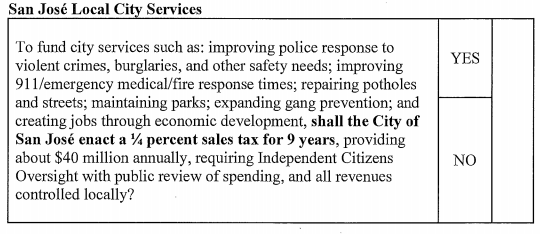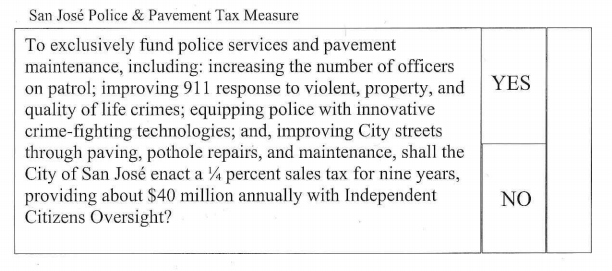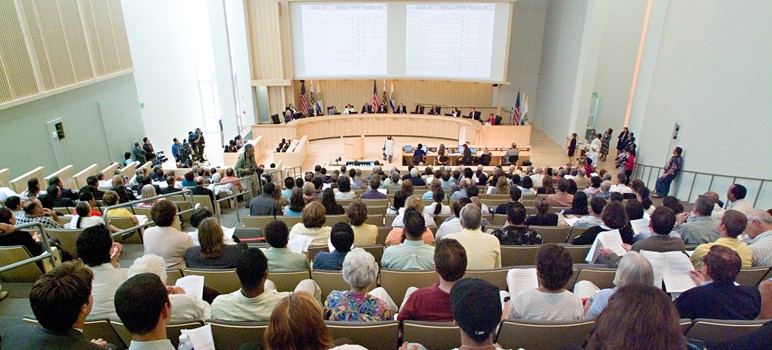San Jose’s City Council will discuss a number of different revenue measures on Tuesday, including one that would levy a tax on businesses and others that would increase the local sales tax.
One measure slated for a June 7 special election is a nine-year, quarter-cent sales tax, which would annually raise $40 million. As a general tax, it would need a simple majority to pass.

A few council members want to replace that measure with a special tax, which requires a two-thirds majority to win. But it would also guarantee that the money is spent on intended purposes: public safety and roads.

“We have no doubt that a super-majority of voters will turn out to support a local tax to adequately fund core city services,” council members Johnny Khamis, Manh Nguyen and Pierluigi Oliverio wrote in a shared memo.
Also on Tuesday, the council will hear a report about a citizen-led measure that would update the city’s business tax. The initiative proposed by San Jose State University sociologist Scott Myers-Lipton would tax businesses based on their gross revenue in the city.
San Jose’s current business tax, which hasn’t been updated in decades, charges a flat rate of $150 a year plus $18 per employee a year for companies with more than eight people on staff. But there’s a cap of $25,000 a year, even for companies making tens of millions of dollars.
The proposed gross receipts tax would charge based on a company’s total annual gross revenue. According to an independent analysis by city-hired consultants Keyser Marston, that would quadruple the city’s business tax revenue. It would also chase away businesses, opponents argue.
San Jose’s existing 30-year-old model nets about $12.7 million a year. Myers-Lipton’s measure would add another $40 million annually to restore public services slashed during the Great Recession.
Mayor Sam Liccardo opposes the measure, which he said would penalize midsized businesses. Myers-Lipton, however, pointed out that about 88 percent of businesses would remain unaffected or pay less.
A recent poll of likely voters shows overwhelming support for the measure, which will likely end up on the November ballot.
Keyser Marston will discuss the city’s existing business tax, present an analysis of the proposed measure and review the city’s options for updating the tax. Some of those options include updating the definition of “employee,” removing the $25,000-a-year cap, expanding the tax base or adding inflation-based adjustments over time.
To view a copy of the presentation, click here.
More from the San Jose City Council agenda for March 8, 2016:
- The city may start cracking down on memorial shrines for homicide victims to discourage loitering, vandalism and secondary violence. According to a draft policy up for consideration, the city reserves the right to remove them after 10 days—or sooner, if there are safety concerns.
WHAT: City Council meets
WHEN: 1:30pm Tuesday
WHERE: City Hall, 200 E. Santa Clara St., San Jose
INFO: City Clerk, 408.535.1260


This sounds just like a pack of wolves and 3 sheep deciding on whats for dinner. Lets just chase all the business out of town, tax the residents to death and rename the place San Jetroit !
Without even bothering to research its origins it’s pretty obvious the transparently duplicitous “Local City Services” tax scheme is the work of the chronically duplicitous Sam Liccardo. “Improving police response,” a phrase meant to conjure up the comforting image of cops on demand, promises no such thing. It’s a pledge worded in such a way that it can be satisfied by hiring even more Community Service Officers, who do in fact respond to violent crimes (traffic control), burglaries (report taking), and other safety needs (accident reports, missing persons, etc.), but do not apprehend criminals (or rescue their victims). Given that this is a mayor with the audacity to equate the hiring of CSO’s with bolstering public safety (of course, it’s armed cops only for his personal protection), the credibility level of this measure is zero. Sam’s simply talking potholes and public safety so he can get more money for his usual suspects.
The alternative tax measure is only marginally less offensive. “Increasing the number of officers on patrol” is hardly a comfort, especially for those victimized by identity thieves, burglars, rapists, robbers, murders, or any other criminal type whose apprehension is dependend upon an responsibly staffed investigation bureau. Besides, “increasing” is so vague as to be meaningless.
Given the chance to vote on either of these measures I will vote “no.” Even if I could stomach the idea of yet another sales tax increase (which I don’t think I can), I could never overcome the realization that a “yes” vote would validate a continuation of the incompetent and dishonest governance that’s become a city tradition.
A sales tax is the more regressive tax there is. Shame on the police union for touting a sales tax increase to pay for lavish police pensions.
Anthony, the men and women of the police officers do not wish to die or be maimed due to the critically low staffing levels. You are at best extremely ignorant, or at worst a Pete Constant type sycophant, who would be the first person hiding under his sheets and calling 911 while his house was being broken into. Go hug another tree, keyboard cowboy.
The general-specific distinction is a joke, Scott Herhold managed to get it right for once when he wrote a column about it during the 2014 Mayor’s race. At the time, Liccardo was saying the same things Khamis/Manh/Oliverio are saying about preventing future fiscal abuse. Herhold pointed out that budgets can be manipulated: a new stream of revenue may have to go directly to public safety, but some of the existing revenue streams feeding into public safety could still be altered. John Oliver pointed out an example of this in his segment on state lotteries. States promises that public lottery proceeds would go to schools, and they did; but the funding that was there previously was redirected and overall funding to education therefore did not increase.
Sam Liccardo understood this when he was running for Mayor, and he understands it now. The three people who signed the memo in favor of the specific tax understand it, as well. Just like when Sam advocated for a special tax, the three people advocating for a special tax are all running for election. Of the five pro-general tax advocates, the only one running for election is Kalra.
Another angle to slice this is, of course, is that Khamis, Nguyen, and Oliverio are the three most conservative members of the City Council. Liccardo has often been known as business-friendly, but he bucked the Chamber of Commerce on the Measure B settlement, and with Measure B dead there simply isn’t a litmus test to divide the liberals from the conservatives on the council. Ramona Giwargis declared the litmus test was how they decided to vote on impact fees in December, but that may have been premature. What will be interesting to watch tomorrow is: 1) whether or not Magdalena sides with her labor allies; and 2) which faction of the Chamber coalition split Chappie decides to side with, Sam-Rose or Manh-Khamis. Tam will predictably side with Manh.
Or . . .
“shall the City of San Jose cut $40 million of useless, wasteful, fraudulent, and abusive expenditures such as “global warming” programs, plastic bag bans, homeless services, LGBT group hugs, ethnic special interest group “celebrations”, sanctuary city propaganda, relocation services and foster care for refugees and illegal immigrants, non-compliance with immigration laws, legal expenditures for non-compliance with federal drug laws, et cetera, et cetera, et cetera”.